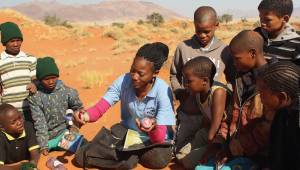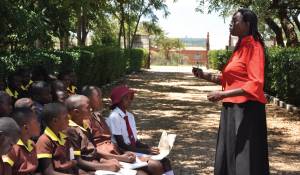Goals
- Build capacity and networking among teacher educators to integrate Education for Sustainable Development (ESD) into all areas and levels of education across Southern Africa.
- Develop educational resources on ESD, with new and updated researched content, knowledge sources, teaching methods and assessment practices.
- Strengthen education and learning in all agendas, programmes and activities that promote sustainable development.
- Reinforce ESD in national and international education and sustainable development policies, with emphasis on policies influencing the education of teachers and TVET educators for Goal 4 of the SDGs (Target 4.7).
- Strengthen the ESD Professional Networks in Southern Africa.
‘Sustainability Starts with Teachers’ is an innovative action-learning programme led by UNESCO that supports capacity building for southern African secondary teacher educators to respond to regional sustainable development concerns and opportunities, the Africa 2063 Agenda and the Global Sustainable Development Goals (SDGs). This programme is especially tailored for Southern African Teacher educators from Early Childhood Care and Education (ECCE), Primary and Secondary Education, and Technical Vocational Education and Training (TVET) coming from 11 countries.
Sustainability Starts with Teachers essentially began as a regional flagship programme of the UNESCO Global Action Programme on Education for Sustainable Development (ESD), implemented between October 2016 to March 2018 by the UNESCO Regional Office for Southern Africa (ROSA) in partnership with the Southern African Regional Universities Association (SARUA), Rhodes University’s Environmental Learning Research Centre (ELRC) and the Swedish International Centre of Education for Sustainable Development (SWEDESD). The project was supported by the Swedish International Development Cooperation Agency (SIDA).
Education for Sustainable Development (ESD)
To inform its learning programme design, and to verify the current status of ESD in the SADC region, Sustainability Starts with Teachers initially produced a draft environmental scan report in 2017. Between July 2017 and March 2018, delegates developed their Change Projects in their respective Teacher Education Institutions. A series of workshops have been conducted over the years to facilitate discussion and guided deliberation on the five Learning Actions which provide a framework for developing ESD curricula for teacher educators, as well as for the diverse Change Projects.
Developing Change Projects
Institution-based Change Projects can be self-defined change initiatives such as curriculum innovations, pedagogical innovations and whole-institution innovations. Change Projects in teacher education can focus on teaching practice improvements, assessment, integration of culture and indigenous knowledge into curriculum, community engagement, and science and technology innovations for sustainability. Through Teacher Education Change Projects, teacher educators and teachers learn valuable lessons which contribute to policy engagement and change, addressing global, regional and national sustainability challenges.
While continuing to develop these Change Projects with teacher educators and institutions, the project aims to support actual changes in programmes and practices towards sustainable development by integrating Education for Sustainable Development (ESD) into teacher education.
Relevance of Intangible Cultural Heritage
Intangible cultural heritage elements related to the domains of knowledge and practices concerning nature and the universe are especially relevant to teaching sustainable development principles in ways that are culturally resonant with students. Thus, through this programme, at least 48 of the 96 Teachers’ advanced ESD Regional Training Programme (ARTP) Change Projects that have been developed until now showcase the effective integration of ESD-related traditional or indigenous knowledge into local teacher education programmes. During the workshops to discuss and curate change projects, The African Union’s Agenda 2063 was discussed as an important reference point, especially in terms of the development and incorporation of indigenous knowledge systems into ESD curricula.
ESD integrated in Policy and Practice
UNESCO is working with education and sustainable development government partners to ensure that the ESD is integrated at policy and practice level as shown by this project aiming at supporting this integration at the level of teacher education policies, curricula and monitoring frameworks through policy dialogues. As per future plan, policy dialogues to advance Education for Sustainable Development in teacher education will be held annually. The purpose is to engage policy actors and educational leaders in capacity-building programme activities in countries as a way of advocating for Education for Sustainable Development integration into policies and leadership activities in teacher/TVET education.
Project Outputs
- Presence of ESD strengthened in national policies and curricula as well as monitoring and evaluation tools for SDG 4, Target 4.7. Educational policy dialogues and programmes are being conducted post the successful completion of the project. As of June 2023l, 11 policy briefs have been developed, one for each country, See the project report here.
- Sustainability principles integrated into education and training environments.
- A website created for the programme to report on Change Projects categorized into different years, including an alumni forum, news, course materials and related resources and an E-learning Library
- A sustainability starts with teachers course (see link to its orientation video here)
- A dedicated Youtube Channel.
Impact
The ‘Sustainability Starts With Teachers’ concluded as a project in March 2018, but was specifically designed to be a catalyst for regional ESD communities of practice to flourish. UNESCO ROSA and its programme partners agreed that while the formal activities of this phase had been completed by 2018, it served as the start for a process of curriculum innovation and enhanced Education for Sustainable Development (ESD) in Southern African countries.
Sustainability Starts with Teachers, has acted as a catalyst for change, of what can become pioneering ESD projects in the SADC region. It was successful in bringing together stalwart ESD practitioners from the region with new emerging teacher educators to better understand ESD and its implications to engage with the requirements of SDG 4 on Quality Education, and to develop practical Change Projects and work on the process of curriculum innovation. It also aims to prepare future teachers for teaching sustainability across the curriculum using a whole-school approach which involves the entire school community and facilities in sustainability practices. The intent is also to develop the Change Projects into potential programmes for introducing ESD change.
Furthermore, to ensure that ESD is integrated at a policy and practice level, the programme will engage policy actors and educational leaders in the participating countries and will look to co-develop monitoring and evaluation tools to contribute to national and regional reporting on SDG 4, Target 4.7.
The Sustainability Starts with Teachers is a collaborative capacity building programme for teacher educators on Education for Sustainable Development in southern Africa. Focusing on the region’s educators to implement changes towards sustainable development will have the catalytic effect of enabling the next generation of teachers to integrate sustainable development into their teaching and community practice, and it will contribute to the achievement of educational quality and relevance in the region.

© UNESCO

© UNESCO

© UNESCO
Check the Sustainability Starts with Teachers website here.
The content of the projects and documents referenced in this platform do not imply the expression of any opinion whatsoever on the part of UNESCO, including designations employed concerning the legal status of any country, territory, city or area or of its authorities or concerning the delimitation of its frontiers or boundaries.
